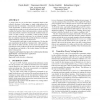Free Online Productivity Tools
i2Speak
i2Symbol
i2OCR
iTex2Img
iWeb2Print
iWeb2Shot
i2Type
iPdf2Split
iPdf2Merge
i2Bopomofo
i2Arabic
i2Style
i2Image
i2PDF
iLatex2Rtf
Sci2ools
124
click to vote
CIKM
2009
Springer
2009
Springer
Voting in social networks
A voting system is a set of rules that a community adopts to take collective decisions. In this paper we study voting systems for a particular kind of community: electronically mediated social networks. In particular, we focus on delegative democracy (a.k.a. proxy voting) that has recently received increased interest for its ability to combine the benefits of direct and representative systems, and that seems also perfectly suited for electronically mediated social networks. In such a context, we consider a voting system in which users can only express their preference for one among the people they are explicitly connected with, and this preference can be propagated transitively, using an attenuation factor. We present this system and we study its properties. We also take into consideration the problem of missing votes, which is particularly relevant in online networks, as some recent case shows. Our experiments on real-world networks provide interesting insight into the significance...
Related Content
| Added | 26 May 2010 |
| Updated | 26 May 2010 |
| Type | Conference |
| Year | 2009 |
| Where | CIKM |
| Authors | Paolo Boldi, Francesco Bonchi, Carlos Castillo, Sebastiano Vigna |
Comments (0)

